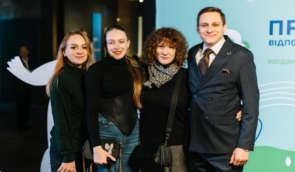Building resilience of civil society in Ukraine: wellbeing as a cornerstone of sustainability
As Russia’s war in Ukraine continues, the resilience of those affected is tested daily. The psychological toll on the Ukrainian population is profound, with widespread reports of trauma, anxiety, and stress-related disorders. Ukrainian civil society organisations have mobilised to provide critical support to those in need while often needing support themselves. HRHF asked the partners from the Network of Human Rights Houses about the connection between mental health and human rights and what kind of role mental health support plays in the resilience of Ukrainian civil society.
 Liudmyla Yankina. Portrait by Iryna Turchak. October 2022, Ukraine.
Liudmyla Yankina. Portrait by Iryna Turchak. October 2022, Ukraine.…Liudmyla Yankina, the Leader of the Civil Society Protection Unit at the Human Rights Centre ZMINA also shared insights on the complexity of burnout among Ukrainian civil society and human rights defenders, primarily stemming from emotional burdens, the relentless pace and load of work amid ongoing conflict and responsibility to continue their work regardless of personal safety concerns.
“This is what reality looks like for many human rights defenders, including myself. After surviving a night of missile attacks, the workday still begins at 8 am.”
“In my work, aside from the initial fear and a purely emotional response during a missile attack that I might be killed, I immediately start to worry about whether any of the people that I work to protect have been affected by the attack, if there have been any direct hits, and if they are safe.”
“I can’t afford to be sick because requests keep pouring in, leading to a sort of chronic fatigue. Colleagues are getting very ill – burning out intensely because the accumulated stress has nowhere to go. This turns into complex depressive conditions, where you find yourself in a very tough emotional state, yet there’s no straightforward solution for your condition, because, after all, you have responsibilities.”
“I have been offered a one-month retreat programme abroad, but I was told that I wouldn’t be able to work during this time. I realise this is simply unrealistic given the volume of work, rendering the programme inaccessible to me… like a child looking at the candy in a shop window – you want it, you see it but it’s not available to you.”
Yankina shared that it’s crucially important to support representatives of civil society and human rights defenders who experience high levels of emotional load and multitasking with adaptive support programmes that would take into consideration the situation of individuals.
Protection of Human Rights defenders and Emergency Support for Ukraine
HRHF has been working alongside several Human Rights Houses (HRHs) for over a decade to protect HRDs at risk in Eastern Europe and the Caucasus through the Network Protection Programme. In addition to that, in 2022-2024 together with the ERIM-led coalition of partners, HRHF has been implementing the Emergency Support Ukraine project (ESU) funded by the European Union. This project aimed to strengthen the resilience and effectiveness of war-affected CSOs and civil society actors in Ukraine, including independent media and human rights defenders.
Over 500 HRDs and their family members were supported during 2023 by the HRHs and HRHF, including within the framework of the ESU project. Besides the emergency support with evacuation, relocation, medications, equipment, and digital and security protection, it was possible to provide psychosocial support and well-being opportunities for individuals and groups of Ukrainian civil society representatives…
Read more: Human Rights House Foundation
If you have found a spelling error, please, notify us by selecting that text and pressing Ctrl+Enter.















